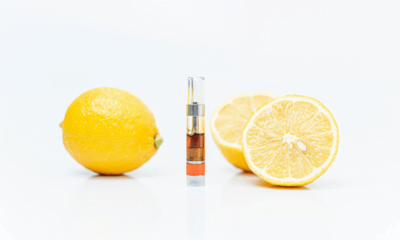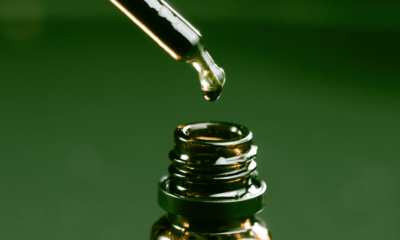With advancements in technology and new regulations coming into force in the UK, CBD supplements are not necessarily made from the cannabis plant anymore. But can synthetic products live up to their natural counterparts?
The multitude of CBD oils, capsules and edibles available in the UK has been streamlined by legislators over the past year, with the introduction of Novel Food regulations. Since the deadline for applications on 31 March 2021 the CBD food supplements industry has been anxiously anticipating the publication of the long-awaited Novel Foods exemption list – due in the coming weeks – while they continue to meet consumer demand with uncertain caution.
Under the tightened regulations, CBD (cannabidiol) is the only ‘cannabinoid’ permitted to be used and sold in food supplements products such as CBD oils. As a result, a host of ‘full spectrum’ products, offering (while sometimes dubious) trace amounts of other cannabinoids, including low-level CBG, CBN and even THC, will no longer be seen on the shelves or websites of UK retailers.

Inside the British Cannabis hemp nursery in Portugal
This narrowing of which CBD UK products will remain legal to sell appears to be dividing the industry into two major product types that look likely to be available for the long term future: natural cannabis-derived CBD or synthetic CBD. The difference between those products which are derived from natural compounds and those which are developed artificially can be confusing for consumers. When it comes to labelling products, brands are only required to list CBD in the ingredients, regardless of the source. As a result, consumers may not be aware of what they actually are buying, never mind the potential benefits for the body or the biochemistry of each source.
We explore the differences between natural and synthetic CBD to help consumers debunk the myths around these products.
Natural or cannabis-derived CBD
In natural or cannabis-derived CBD, cannabidiol is extracted from cannabis Sativa L. (hemp) or possibly from other cannabis strains if it has been grown outside of the EU. This has naturally (no pun intended) been the most common ingredient source for CBD products in recent years.
Often ‘full extract’ cannabis products contain at least trace elements of other cannabinoids (including CBG, CBN and THC) but Novel Foods regulations that allow CBD products to remain on the market call for an approach that leaves CBD as the only predominant compound in products.
As a result, CBD isolate has emerged as a faster, more prevalent ingredient than ‘full’ or ‘broad’ spectrum extract products, with many brands opting for this method to avoid any issues with regulators. This has led to a slew of CBD oils that are just single-molecule CBD – combined with carrier oils such as MCT and coconut – becoming prevalent.

What is CBD isolate?
CBD isolate is a pure form of CBD, which contains no other cannabinoids or compounds. As with all CBD, it can be extracted from the hemp plant using various methods, including carbon dioxide extraction, solvent extraction or lipid extraction but undergoes more refined processing, resulting in a crystal form which is then ground into a powder. It is thought that isolate offers all the benefits of full extract CBD, but effects may be less noticeable due to the lack of other cannabis phytochemicals.
Environmentally friendly
When hemp (cannabis Sativa L) has been grown outdoors for a purpose, it is GMO-free, has relatively low water use, grows relatively easily and quickly (around 60-90 days per crop), with no herbicides or pesticides needed. Around 15 tonnes of CO2 are processed by each hectare of Cannabis Sativa L (Hemp), via conversion by the plant’s leaves and stem – a higher rate than any other commercial crop known. This more than offsets any carbon used in production or transportation.
Economically savvy
Another economic benefit of natural cannabis products is the additional work that is created for the agricultural sector throughout the process. From seeding, growing, harvesting and processing to refining and testing, a plethora of jobs across the supply chain are generated from seed to sale.
As of late 2021 market conditions, a kilogram of naturally-extracted CBD isolate carries a price around one-seventh of the cost of its synthetic counterparts, so going natural will currently drive prices down for consumers. Extracting from hemp also allows for the other phytocannabinoids which are found in the plant to be used for other applications, such as in cosmetics which often contain minor cannabinoids.
Whole-plant benefits
With products like Canabidol™ from British Cannabis™, it is possible to take multiple natural extracts and expertly recombine them to form whole-plant products, made only from 100 per cent of cannabis, that still passes the regulatory requirements by being free of unwanted constituents like THC.
The British Cannabis approach is precision engineering, developed from over six years of knowledge of growing and studying industrial cannabis. This gives its products the whole-plant taste and phytochemical profile but with zero per cent THC or other cannabinoids illegal for use in food products.
Its leading pharmacy-sector CBD brand, Canabidol™ contains only 100% Cannabis phytochemicals and cannabis-extracted CBD. This 100 per cent compliant range is now available with a new, super-premium packaging to revamp.

The new rebranded Canabidol range
Synthetic CBD
Recently the industry has seen the emergence of brands with lab-made replicas of the CBD molecule as their core ingredient.
Additionally, some manufacturers are claiming that their synthetic CBD is made from natural sources, such as orange peel. These compounds are said to be ‘bio-identical to cannabidiol (CBD), however, the processes that it goes through to get to this point has not yet been proven to have the same tested effects observed with natural cannabis extracts.
While it may be possible to utilise terpenes derived from oranges to create molecularly-similar compounds to CBD, it still requires controversial chemicals to create this, something brands frequently fail to mention in their marketing.
A ‘highly pure’ product
What these brands describe as “highly pure” products may appeal to some consumers, due to them only containing one single compound, so there is no trace of THC. The process also means that there is no variation between batches or risk of toxicity from pollutants. Some brands also claim that the methods they use have allowed them to enhance the bioavailability, improving the absorption of CBD by the body and therefore producing more effective products.
The entourage effect
However, proponents of naturally extracted CBD argue that there is more to cannabis than cannabinoids and a lot of the essential phytochemicals found in the plant have been shown to be critical in producing the entourage effect of benefits. These compounds, from naturally extracted flavonoids to terpenes and aminos, can still be put into products by companies with the right approach. As CBD oil products of synthetic origin are most often ‘single molecule’ products they may be losing out of these effects.
Tom Whettem, CEO of British Cannabis, said: “Time and time again, dating back to the original studies that coined the phrase ‘the entourage effect’, it has been clinically demonstrated that CBD alone is not as effective as when taken with the many hundreds of other cannabis phytochemicals from the plant, such as with our THC-Free, 100 per cent cannabis oils from Canabidol. It is undisputed that it is inferior to a full plant extraction. Synthetic CBD is cheap to produce, though as stated earlier, is being charged by manufacturers at several times more expensive than it should be.”

British Cannabis products offer the whole-plant taste and phytochemical profile, with zero per cent THC
Traces of chemicals
In addition, consumers should be aware that some of the chemicals used to synthesise CBD have been found to be toxic and are often found as trace by-products in synthetic CBD products at detectable levels.
Heptane, for example, used in the manufacturing process for some synthetic cannabidiol products[2], is a flammable, hazardous chemical commonly linked to side effects including headache, light-headedness, lack of coordination and loss of consciousness, as well as a variety of serious chronic health effects that can be linked to prolonged exposure.
A residual n-Heptane solvent has been shown as detectable in the published Certificates of Analysis of an unnamed synthetic CBD manufacturer, as shown below:
Another chemical used in synthetic production of CBD is dichloromethane which is a carcinogen, linked to cancer. In a study by the Centre for Medicinal Cannabis, the report data for another synthetic CBD product showed that dichloromethane was detectable in seven products (3.8-13.1ppm) and cyclohexane was found in one (27.9ppm).
Twenty five per cent of products that were tested contain trace amounts of this hazardous chemical. When compared with natural CBD, which is only extracted with ethanol or co2, which are approved by regulators and found across the entire food supply chain.
To sum up, not all CBD is created equal, but ultimately, it’s up to the consumer to do their own research, draw their own conclusions and decide which product is right for them.


 Industry6 months ago
Industry6 months ago
 News6 months ago
News6 months ago
 News5 months ago
News5 months ago
 News6 months ago
News6 months ago
 Science5 months ago
Science5 months ago
 Industry5 months ago
Industry5 months ago
 News5 months ago
News5 months ago
 Patients6 months ago
Patients6 months ago

















